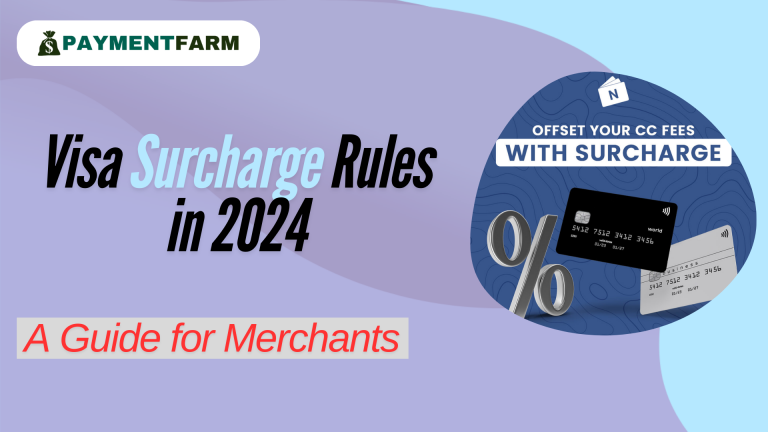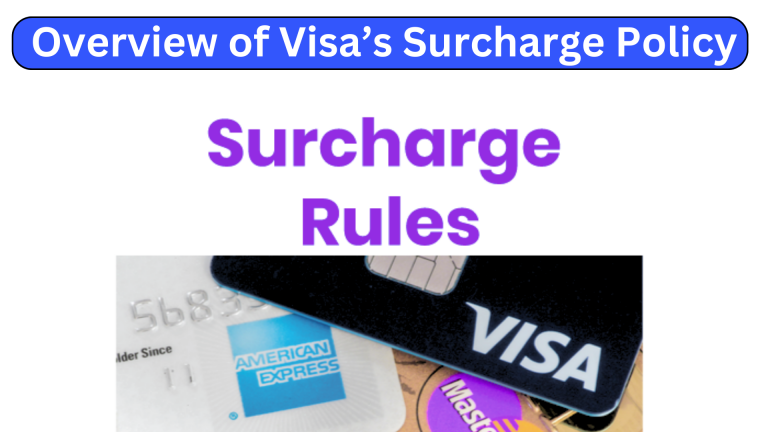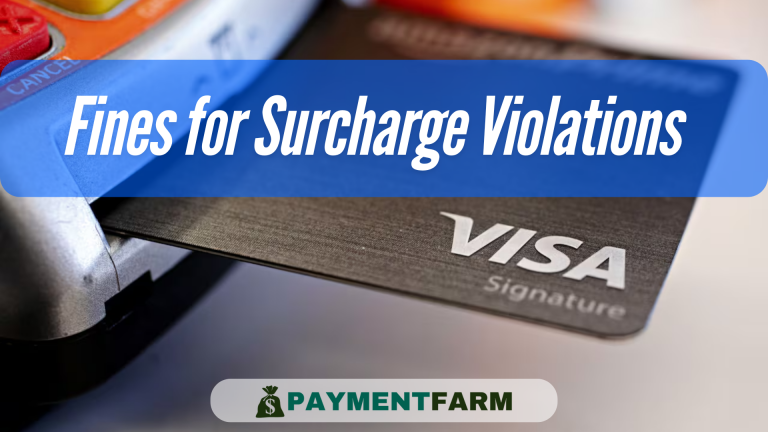Do you know that delinquency on small businesses has reached an all-time record high due to inflation and lost revenues? According to a recent study by Alignable, 43% of SMBs couldn’t pay rent on time and in full April 2024. This is why, today more than ever, US merchants need to handle their operation costs with care. To do so, often forgotten is to optimize their payment processing to shave off fees paid for purchases made credit card surcharging. Card companies like Visa, Mastercard, Discover, etc.

charge interchange fees which, in addition to other credit card processing fees, can consume your profits. In this regard, credit card Visa Surcharge is beneficial for offsetting such costs. With it, merchants can transfer the processing costs to customers who choose to makecredit card surcharging payments. Interestingly, before 2013, surcharging was prohibited in the majority of states. Following a historic ruling, the courts compelled credit card companies to permit retailers to use surcharging. To stop retailers from misusing this advantage, local and federal laws, as well as card brand regulations, have been put in place. Heavy fines and maybe the suspension of their merchant accounts may result from noncompliance. We will discuss Visa Surcharge rules 2024 regarding credit card surcharging and what merchants need to know about it in this article.
What are Payment Processing Surcharges?
Fees companies charge consumers to pay for credit card surcharging or other means of processing payments. Such fees tend to range between 1.5% and 3.5% of the transaction.
Legal Status: Allowed in certain geographies but banned in others with disclosure requirements.
Impact on Consumers: Dissuades consumers from using a particular form of payment as well as lowering satisfaction
Alternatives: Cash discount, or add it to a price of the product.
Being Aware Visa Surcharge Rules 2024
Before we go any further, let’s talk about what a surcharge is. A credit card surcharge is an additional fee a merchant adds to the final bill of a customer when he or she elects to pay with a credit card. Surcharges allow businesses to recoup some or all of the costs of processing credit card payments. As a result, card networks such as Visa don’t like surcharging very much. Surcharging might make the cardholders use their credit cards less. Obviously, reduced usage of credit cards reduces the bottom line of the card companies. According to the latest reports, Visa wants to strictly enforce its surcharging rules. It would like to increase interchange fees but also control how much merchant surcharge can be added to customers’ bills so they don’t get discouraged from using credit cards. Merchants need to be aware of the rules and regulations regarding Visa’s surcharging because non-compliance would incur fines ranging from $50,000 to $1 million. Visa is among the four biggest credit card issuers in America, and it’s also the most widely used card processor in the world. Thus, merchants can’t ignore the directives given by Visa.
How to Apply a Surcharge?
It can be very challenging for small businesses to implement a credit card surcharging program while keeping in mind all the applicable federal and state laws and card brand rules. You can simply work with a payment processor such as CardX by Stax, which will help you deal with all the paperwork and also ensure that everything is done according to all the regulations.
Let’s take a look at the basic steps of applying a surcharging program.
- See all rules regarding displaying your surcharging program to your customers and ensure your stores comply with them. There is also specific rule-making surrounding signs and where they should appear. You should have legible signs posting both online and offline. You’re going to need to put signs up at all entrance points and at all points of transaction or sale.
- Work with your merchant account provider or payment processor to notify the card networks and acquirers 30 days before you begin adding surcharges. These companies require written notice that your payment processor will take care of.
- Review your business data to know what sort of surcharging will work best for you and the type of surcharge rate to apply. You should also prepare for how surcharging may impact your customer base.
Overview of Visa’s Surcharge Policy
The following summarizes Visa’s surcharge rules in a nutshell:

- Disclosure: Businesses have to disclose their surcharging program to customers. In other words, customers have to be informed at every step that a credit card surcharge is going to be charged at the time of checkout from a point of sale (POS). This includes both in-store and online shopping. Signage has to be available at all entrances and points of sale and the surcharge has to be reflected as a separate line item on receipts.
- Compliance with state-level surcharge laws: Merchants must comply with the state laws in case they choose to implement a surcharge program. While surcharging is now permitted in most US territories and states, some states have extra rules and restrictions. For instance, New York and California have additional rules and restrictions regarding surcharging. If a business has stores in different states, then each store must comply with the surcharging rules of the state it is located in.
- Surcharge options: Businesses in the US can choose brand-level or product-level surcharging, but not both. Brand-level surcharging means merchants can apply a surcharge to all transactions made via Visa credit cards. Product-level surcharging allows businesses to surcharge a certain credit card type/product issued by Visa.
- Notifications: Before you begin a surcharging program, you must give notice to your acquirer at least 30 days in advance. After beginning a surcharging program, you also need to identify the surcharge amount in a separate data field of transaction messages that you send out to Visa. As of April 15, 2023, merchants will only need to give notice to their acquirer 30 days before they begin surcharging. They no longer need to provide notice to Visa.
- Surcharge rate limit: To enhance customer experience, Visa has cut down the surcharge cap to 3% effective April 15, 2023. In earlier days, it was 4%. Of course, these limits also vary by state Colorado caps surcharges at 2%. As such, what Visa asks businesses to do is limit the surcharge to either the merchant discount rate (MDR) of the credit card or 3%, whichever is lower.
- Available only on credit cards: Surcharges cannot be passed on to Visa debit cards and only apply to credit card transactions. Also not permitted to be surcharged are prepaid cards.
What is the Impact of Surcharge Bans?
Surcharge bans, which bar extra fees for certain payment methods, such as credit cards, have mixed effects:
- Consumers: Benefit from fairer, more transparent pricing but may pay more in total due to business’s processing fees.
- Businesses: Suffer loss of flexibility to offset card fees, which may translate into higher prices or reduced margins.
- Payment Systems: More card usage, which benefits the payment networks but puts pressure on businesses to seek lower fees.
- Market Effects: It will encourage consumers to spend but may result in weaker price transparency.
Visa Surcharge Consumer Rights
- Transparency: Surcharge shall be disclosed before transaction and on the receipt.
- Fee Limits: Surcharge should not exceed the actual processing cost of a merchant.
- Equal Treatment: All Visa cardholders are equal; no surcharge that disproportionately affects certain users.
- Legal Compliance: Surcharge shall comply with the law of the place where a merchant is located.
- Consumer Reporting: Can file complaints for unfair surcharges to be investigated by Visa.
Legal Surcharge Limits UK
In the UK, the Payment Services Regulations 2017 banned surcharges on consumer payments made by credit card surcharging or debit cards, PayPal, and similar services. Here are the key points:
- Ban on Surcharges: Most types of card payments are not allowed to be charged extra fees. This is both for in-person and online transactions.
- Scope: The ban covers payments made by consumer debit cards, credit card surcharging, and electronic payment services like PayPal.
- Exemptions: The ban does not cover commercial cards, which businesses use, or some specialized payment services.
- Enforcement: Local trading standards enforce the law. Consumers can report violators.
- Surcharge compliance penalties: Businesses that break the law may be fined or taken to court.
Fines for Surcharge Violations
In the UK, organizations that breach the surcharge ban under the Payment Services Regulations 2017 can face fines; however, these fines are generally dealt with by enforcement authorities like Trading Standards. Key points relating to fines and penalties include:

- Investigation and Enforcement: Trading Standards investigates complaints and can take action against non-compliant organizations.
- Fines: Fine amounts are not predetermined but are instead determined by a more severe breach and at the discretion of the local authority.
- Legal Action: Serious or persistent violations can result in court cases, with fines and other penalties being levied.
- Repay: Business enterprises may be obliged to pay back consumers who have been overcharged.
- Consumer Registering: Consumers may lodge complaints with Trading Standards or seek redress through small claims courts if overcharged.
Effects on Customers and Merchants
Customers appear to benefit from Visa’s recent modifications, which reduce the surcharge price. Businesses can reduce the cost of processing credit card surcharging in various ways besides surcharging. In order to save retailers money on credit card processing fees, cash discounting is a wonderful technique to encourage customers to pay with cash. In every state, including Connecticut, where credit card surcharging is prohibited, cash discounts are permitted.
To sum up
The new surcharge rules introduced by Visa Surcharge limit surcharges at 3% or the merchant’s discount rate, whichever is lower; require explicit disclosure at each step of a transaction; and allow only credit card surcharges but not debit or prepaid. The state-specific rules apply, the acquirers must be notified 30 days before surcharges, and no group of cardholders may be discriminated against. Violations may lead to account suspension or fines of up to $1 million. Still, even in states like Connecticut that prohibit surcharges, cash discounting provides a means for merchants to recover processing fees by encouraging cash payments.
Faqs
How can one define a surcharge?
A surcharge is an extra cost that consumers pay when using a credit card, which enables businesses to recoup their processing expenses.
Are surcharges allowed for all types of Visa cards?
No, surcharges are allowed only on credit card transactions. They cannot be applied to Visa Surcharge debit cards or prepaid cards.
Can surcharges exceed 3% in states without specific laws?
No, Visa Surcharge global policy limits surcharges to 3% or the merchant’s processing cost (whichever is lower), even in states without explicit surcharge limits.
How should credit card surcharging be displayed on receipts?
credit card Visa Surcharge should be listed on the receipt as a line item so that customers are clearly aware of the extra charge.
Which states still prohibit credit card surcharging entirely?
Connecticut and Massachusetts in the United States do not allow credit card credit card surcharging. Businesses in these states must look for other means of offsetting payment processing costs.
Are merchants allowed to surcharge online transactions?
Yes, merchants can surcharge online credit card sales, but only if all disclosure and compliance requirements are met.
Do merchants need to notify Visa of surcharges?
No, as of April 15, 2023, merchants need only notify their acquirer (payment processor) 30 days before commencing a surcharge program.
Are cash discounts the same as surcharges?
No, cash discounts are legal in all states and represent reducing the price for customers who pay in cash, rather than tacking on a fee for card users.
What happens when the customer disputes a surcharge?
If the surcharge is in violation of either Visa rules or local law, the cardholder is permitted to file a dispute. The merchant may be required by Visa Surcharge to reimburse the cardholder.
